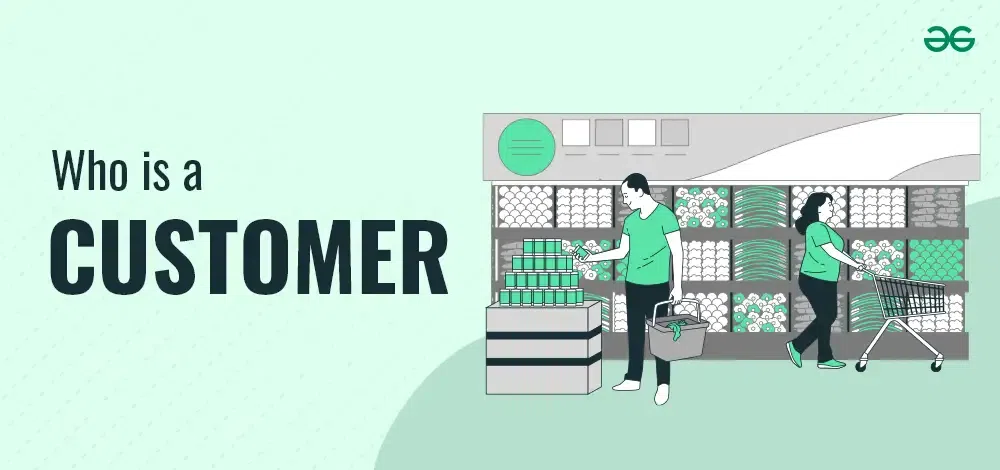Customer : Meaning, Types and Importance
Last Updated :
11 Mar, 2024
Who is a Customer?
A customer is someone who buys things from a business. It is simple they are the people reaching into their pockets, pulling out cash or cards, and making transactions happen. Customers play a vital role in the business world because, without them, there’s no cash flow. They could be individuals picking up groceries, a company ordering office supplies, or anyone engaging in a financial exchange for goods or services. Essentially, customers are the economic drivers of businesses, and their choices shape market trends. Understanding what customers want, providing quality products or services, and ensuring a positive buying experience are key factors in keeping customers satisfied and encouraging repeat business – the lifeblood of any successful enterprise.

Types of Customers
1. B2C (Business-to-Consumer): B2C, or Business-to-Consumer, is when businesses directly sell goods or services to regular customers. Think of the local store where you buy clothes or the online shop where you grab a new gadget. The main focus here is on individual buyers, making sure they like what’s offered and have a good experience. Retail businesses, both physical and online, fall into this category. It’s about getting everyday items into the hands of personal customers, making the product appealing and easy for people like you and me to buy.
2. B2B (Business-to-Business): B2B, or Business-to-Business, is when businesses sell things not to individuals but to other businesses. For instance, think of a company selling office supplies. They’re not trying to attract you; they’re aiming at other businesses needing goods or services in bulk. B2B deals are about efficiency, saving costs, and providing solutions for a business’s needs. It’s a different game; more about contracts, negotiations, and building long-term partnerships to meet the needs of another business rather than a regular shopper.
3. C2C (Consumer-to-Consumer): C2C, or Consumer-to-Consumer, is when people directly trade or sell things to each other, often online. Picture an online marketplace where individuals sell or swap goods. It’s like a digital garage sale. In this setup, regular people act as both sellers and buyers, interacting with each other. It’s a peer-to-peer exchange – whether it’s selling an old bike, swapping collectibles, or offering services. C2C platforms create a space for individuals to connect and do business without a big company in the middle. It’s all about direct interaction between consumers in the online world, making deals that suit personal preferences and needs.
Why are Customers Important?
Customers are the lifeblood of a business, holding immense importance for various reasons:
1. Financial Support: Customers are the ones putting money in the business’s pocket. Their purchases directly contribute to the money the business makes, helping cover costs, expand operations, and stay afloat.
2. Guiding Product Choices: What customers like and want guides a business in deciding what to offer. By understanding customer preferences, a business can provide a variety of products or services, appealing to a broader range of people and staying competitive.
3. Creating a Community: Customers form a kind of community around a business. When a business builds relationships with its customers, it creates a sense of belonging. This community not only keeps customers coming back but also contributes to a positive image for the business.
4. Setting Trends: The choices customers make influence what becomes popular in the market. Businesses that pay attention to what customers like can adapt to trends, staying relevant and appealing in a dynamic market.
5. Long-Term Growth Through Happy Customers: When customers are happy, they come back. Building satisfaction leads to loyal customers, ensuring a steady income. Loyal customers also reduce the need for businesses to constantly find new customers, contributing to sustainable growth.
Frequently Asked Questions (FAQs)
How can we understand our customers better?
Understanding customers involves collecting and analyzing data on their preferences, behaviors, and feedback. Implement customer surveys, conduct market research, and leverage analytics tools to gain insights. Social media monitoring and direct customer interactions also provide valuable information to comprehend their needs and expectations.
How can we improve customer satisfaction?
Customer satisfaction can be enhanced by delivering excellent products or services, providing prompt and helpful customer support, and ensuring a seamless buying experience. Act on customer feedback, address concerns promptly, and focus on continuous improvement. Personalization and a customer-centric approach also contribute to increased satisfaction.
What is the importance of customer retention?
Customer retention is crucial for the long-term success of a business. It costs less to retain existing customers than to acquire new ones. Loyal customers tend to make repeat purchases, recommend the brand to others, and provide valuable feedback. Establishing strong relationships with customers through personalized experiences and excellent service fosters loyalty.
How can we handle customer complaints effectively?
Addressing customer complaints promptly and effectively is essential. Listen actively to their concerns, empathize with their experiences, and offer solutions. Ensure a transparent and easy-to-follow complaint resolution process. Use negative feedback as an opportunity to improve products or services and demonstrate a commitment to customer satisfaction.
What is the role of customer feedback in business growth?
Customer feedback is a valuable tool for business growth. It provides insights into areas that need improvement, helps identify market trends, and guides product/service development. Actively seek feedback through surveys, reviews, and social media. Positive feedback can be leveraged for testimonials and marketing, while constructive criticism can drive strategic changes for business growth.
Share your thoughts in the comments
Please Login to comment...